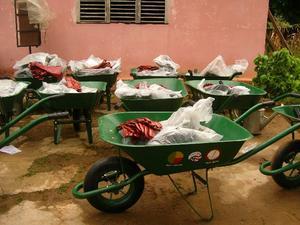Advertisement
Published: August 18th 2006

 Awards
Awards
Notice the design on the wheelbarrows. Pretty darn good, eh? They are filled with boots, shovel and rake heads, and a few rain drops.I like sleeping until 7h. That’s about the time the bedroom starts getting warm, the neighbors play music, and I have to pee. After two months, I have returned to that practice, except for those mornings I get up earlier to run. It’s not that for those two months I slept until 8h, oh no; for two months I was on my bike by 6h15 to go to work with Florent and Patrice, the two others at As.P.E.L. with whom I conducted the project “Competition: Cleanest and Greenest City.” This was quite the project. I committed myself to be in Athieme every morning for eight straight weeks. I love Athieme, but I also like to get supplies in Cotonou or visit the beach… I was able to fit in a couple days of escape.
The project started on the Beninese Labor Day, May 1st. The presidents, secretaries, and organizers of each women’s group came to Athieme for a morning training on environmental protection; the importance of trees, the benefits of well-kept public areas, the dangers of allowing children and animals in trash piles, and possible ways to transform/hide common waste. The training went very well. The next day we were “au village” to see what kind of work the women had going on.
The women wake up at 6h or so, the Organizer gonging the gong to get people out of bed and working. Each woman uses some form of broom, either the small bundle of sticks or the large palm tree leaf, and she sweeps the public pathways. Other women use a hoe to knock down the weeds and grass growing along the sides of the paths. Along with the organic waste, such as weeds, dirt, and kitchen waste, the women also sweep up inorganic waste such as empty tin cans, razors, and other rather dangerous items. The dustpan is a piece of rusted out metal. The waste is dumped in the communal trash heap, where it sits exposed to the public eye, young pooping children, and pigs and other animals.
For the following two months, Patrice, Florent, and I surveyed the women’s work, judging them according to the quality of the sweeping/hoeing, the readjustment of the trash dump site and subsequent composting opportunity, how well the groups’ account books were kept, the evolution of any secondary projects such as gardening or animal raising, and the number, placement, and quality of care for the plants and trees the women had planted.
As with any project, there are positives and negatives, though the positives greatly outweigh the negatives. If I were to do this same project over again, I would change a few things that would highly increase the positives. I would be certain to consider the groups of women separately from their village, and to choose groups of women from nearby and accessible villages, rather than selecting villages kind of at random. For example, the rather large town of Awame was considered by itself as one women’s group for the awards, but there are three women’s groups in the town, if not more. This caused a lot of problems when we awarded prizes because we only had one wheelbarrow for the entire community. Also, As.P.E.L. trekked through mud almost every week to reach Adjove. Adjove is a good place, but while we were biking/hiking a good couple of kilometers away from Athieme, there were women’s groups much closer that were just as active. I would also not be such a blind pushover while preparing for the awards’ ceremony. That may be a little harsh- celebrating in Benin is different from in the States, and I did well in letting others decide who to invite and how to make the days’ program, but I would do better keeping my voice in the mix as well. (Bossy toes, bossy toes!)
But the positives are positive. Of the four divisions of volunteers in Benin, this project touched three: environmental with tree planting and composting, public health with the waste management, and even a little business accounting to help keep the books. Next time I will try to work in a little English grammar. About thirty trees were planted, and many women’s groups are composting and working to start a garden together. Because of the attention As.P.E.L. gave the women for their work, the population in each village also started to take the work seriously and are now helping the women, too. As.P.E.L. itself gained some notoriety and has a little more respect form the community.
We held the awards ceremony on July 18th, and although it was stressful, it’s over and done with and the women have wheelbarrows, shovels, rakes, boots, gloves, and even a few watering cans. Other than being sorry not everyone can win 1st place, we are all happy. Especially me, in bed until 7h. Thanks to everyone who contributed to the project!
Advertisement
Tot: 0.14s; Tpl: 0.011s; cc: 11; qc: 77; dbt: 0.0944s; 1; m:domysql w:travelblog (10.17.0.13); sld: 1;
; mem: 1.2mb







